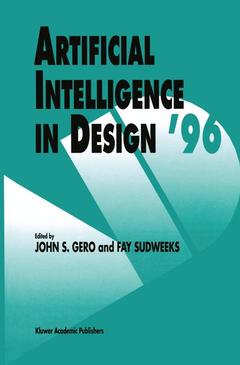Description
Artificial Intelligence in Design ’96, Softcover reprint of the original 1st ed. 1996
Coordinators: Gero John S., Sudweeks Fay
Language: English
Subject for Artificial Intelligence in Design ’96:
Publication date: 01-2012
782 p. · 16x24 cm · Paperback
782 p. · 16x24 cm · Paperback
Description
/li>Contents
/li>
Change is one of the most significant parameters in our society. Designers are amongst the primary change agents for any society. As a consequence design is an important research topic in engineering and architecture and related disciplines, since design is not only a means of change but is also one of the keystones to economic competitiveness and the fundamental precursor to manufacturing. The development of computational models founded on the artificial intelligence paradigm has provided an impetus for much of current design research -both computational and cognitive. These forms of design research have only been carried out in the last decade or so and in the temporal sense they are still immature. Notwithstanding this immaturity, noticeable advances have been made both in extending our understanding of design and in developing tools based on that understanding. Whilst many researchers in the field of artificial intelligence in design utilise ideas about how humans design as one source of concepts there is normally no attempt to model human designers. Rather the results of the research presented in this volume demonstrate approaches to increasing our understanding of design as a process.
1 Representations in Design.- Multi-level molecular representation.- Text analysis for constructing design representations.- Learning genetic representations as alternative to hand-coded shape grammars.- 2 Design Objects.- Reactive design agents in solid modelling.- A framework for design object evolution.- Creating design objects from cases for interactive spatial composition.- 3: Genetic Algorithms/Genetic Programming in Design.- Integrating a genetic algorithm into a knowledge-based system for ordering complex design processes.- AI in control system design using a new paradigm for design representation.- Automated design of both the topology and sizing of analog electrical circuits using genetic programming.- 4: Case-Based Design.- A study of case adaptation systems.- Applying formal methods to case based design aids.- Designing nutritional menus using case-based and rule-based reasoning.- 5: Reuse of Designs.- On design formalization and retrieval of reuse candidates.- Design rationale and design patterns in reusable software design.- Constraint-based retrieval of engineering design cases.- 6: Grammars in Design.- A networks approach for representation and evolution of shape grammars.- Variable-complexity evolution of shape grammars for engineering design.- Grammars for machine design.- 7: Design Spaces.- Design sheet: A system for exploring design space.- Using modeling knowledge to guide design space search.- Explanatory interface in interactive design environments.- 8: Learning in Design.- Learning by single function agents during spring design.- A machine learning approach to design automated classification, association and retrieval.- Learning to choose a reformulation for numerical optimization of engineering design.- 9: Distributed Design.- Virtual building site: Supporting building design by multiple methods in FABEL.- A mobile-agent oriented approach to a distributed design support system.- VisionManager: A computer environment for design evolution capture.- 10: Rules, Models and Theories in Design.- Elicitation of rules for graphic design evaluation.- A model-based tool for finding faults in hardware designs.- On knowledge level theories of design process.- 11: Conceptual Design.- A representation scheme to support conceptual design of mechatronic systems.- Generating conceptual solutions on FuncSION: Evolution of a functional synthesiser.- Adopting a minimum commitment principle for computer aided geometric design systems.- 12: Spatial and Layout Planning in Design.- The generation of form using an evolutionary approach.- Evolutionary layout design.- DOM-ARCADE: Assistance services for construction, evaluation, and adaptation of design layouts.- 13: Creativity and Innovation in Design.- Emergent behaviour in co-evolutionary design.- Innovative design based on sharable physical knowledge.- Assisting creativity by composite representation.- Skeleton-based techniques for the creative synthesis of structural shapes.- First author electronic addresses.- Author index.
© 2024 LAVOISIER S.A.S.




